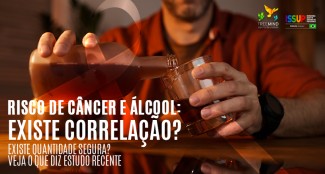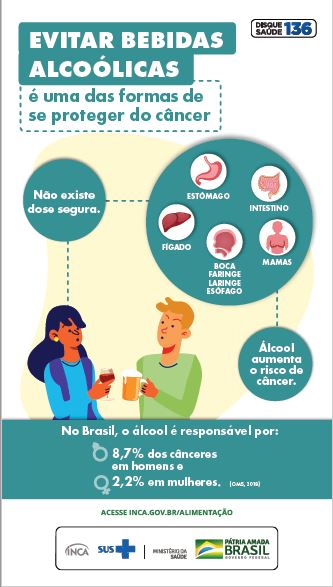Does Cancer Risk Increase With Alcohol Consumption?

A study published on July 13 by the scientific journal The Lancet Oncology attributed more than 4% of all new cancer cases in 2020 to alcohol consumption.
Cancer – what is it?
Cancer is a term that encompasses more than 100 different types of malignancies that have in common the disordered growth of cells, which can invade adjacent tissues or organs at a distance.
Dividing rapidly, these cells tend to be very aggressive and uncontrollable, leading to the formation of tumors, which can spread to other regions of the body.
Cancer arises from a genetic mutation, that is, from an alteration in the DNA of the cell, which starts to receive wrong instructions for its activities.
The process of cancer formation is called carcinogenesis or oncogenesis, and it usually happens slowly, and it can take several years for a cancer cell to proliferate and give rise to a visible tumor. The cumulative effects of different carcinogens or carcinogens are responsible for the initiation, promotion, progression, and inhibition of the tumor.
Carcinogenesis is determined by exposure to these agents, at a given frequency and in a given period of time, and by the interaction between them. However, individual characteristics must be considered, which facilitate or hinder the onset of cell damage.
Between 80% and 90% of cancer cases are associated with external causes and only 10 to 20% with genetic factors. Man's own changes in the environment, habits, and lifestyle can increase the risk of different types of cancer.
Risk factors for developing cancer
The term "risk" is used to define the chance that a healthy person, exposed to certain environmental or hereditary factors, will develop a disease. Factors associated with an increased risk of developing a disease are called risk factors.
The same risk factor can be a risk factor for several diseases – smoking and obesity, for example, are risk factors for several cancers, as well as cardiovascular and respiratory diseases.
Several risk factors may be involved in the origin of the same disease. Studies show, for example, the association between alcohol, tobacco, and oral cavity cancer.
Risk factors can be found in the physical environment, inherited or the result of habits or customs of a particular social and cultural environment.
Alcohol and cancer
Alcoholic beverages should not be consumed, as they favor the development of several types of cancer.
Studies show that consuming alcoholic beverages increases the risk of developing different types of cancer such as mouth, pharynx, larynx, esophagus, stomach, liver, intestine (colon and rectum), and breast. For cancer prevention, there are no safe levels of intake.
This recommendation applies to all alcoholic beverages. In addition, the combination of alcohol and tobacco increases the possibility of the emergence of this group of diseases.

Alcohol can cause the onset of cancer by different mechanisms. These vary according to the type of cancer associated. The mechanisms involved can directly damage the DNA of cells, cause oxidative stress that can damage genes, facilitate the penetration of environmental carcinogens into cells, alter hormonal metabolism, cause malnutrition that makes human tissues more sensitive to the effects of alcohol, among others less frequent.
It is important to highlight that there is a clear dose-response relationship between alcohol consumption and cancer risk. In other words, the higher the dose ingested and the longer the exposure time, the greater the risk of developing the types of cancers already mentioned.
What a new study published in July 2021 says
A study, published in the journal The Lancet Oncology on July 13, indicates that 4% of new cancer cases in 2020 are associated with alcohol consumption. The incidence is higher in men (76% of cases), who were diagnosed primarily with cancers of the esophagus, liver, breast, colorectal, mouth, and throat.
Of the global total of cancer cases associated with alcohol consumption, 39% or 291,000 were diagnosed in people who drink 20g to 60g a day, corresponding to two and six drinks. The highest rates were recorded in East Asia (5.7% of the global data) and Central and Eastern Europe (5.6 %). The lowest are in North Africa (0.3%) and West Asia (0.7%).
For those who consumed more than six doses, the record was 47% of the total new cancer diagnoses. Even moderate doses are worrisome — this level of consumption accounted for 14% of the total, or 103,100 cases.
The researchers analyzed the available data on the population's alcohol intake in 2010 and on cancer cases in 2020. The 10-year period between alcohol consumption and the onset of cancer is due to the fact that the types of cancer studied - mouth and lips, larynx and breast (among women) - take long periods to develop and have a causal relationship with alcohol consumption.
Of the 741,300 new alcohol-related cancer cases diagnosed last year, 568,700 were in men and 172,600 in women. Most were in the esophagus, liver, and breasts.
Nearly 47 percent of cancers attributed to alcohol were related to binge drinking, which the authors defined as 60 or more grams of ethyl alcohol (the alcohol found in alcoholic beverages), or more than six drinks per day.
The consumption of 20 to 60 grams (two to six drinks) of alcoholic beverages per day, which the authors defined as "risky consumption," accounted for 39.4% of cancer cases attributable to alcohol.
Moderate drinking (drinking 20 grams or less, or up to two drinks, per day) contributed to nearly 14% of cases. And the highest rates of alcohol-related cancers occurred among men who drank 30 to 50 grams of ethyl alcohol per day and in women who consumed 10 to 30 grams per day.
This study provided updated estimates of the global burden of cancer attributable to alcohol consumption stratified by sex, cancer site, and country, using cancer incidence estimates from the International Agency for Research on Cancer's GLOBOCAN 2020 database and data on alcohol consumption patterns worldwide from the Global Alcohol and Health Information System.
The contribution of different levels of alcohol intake to the burden of cancer attributable to alcohol was also quantified.
Alcohol consumption causes a substantial burden of cancer worldwide, and there are large disparities between populations.
The study has a number of limitations, such as, for example, the cancer incidence estimates for 2020 used did not take into account changes in cancer reporting due to interruptions in care by health systems as a result of the COVID-19 pandemic, a pandemic that may also have affected the total alcohol consumption by individuals.
However, any changes in alcohol consumption patterns among individuals are not yet evident for current cancer rates, but may be reflected in the coming decades.
In summary, the study showed that alcohol use causes a substantial burden of cancer, which could be avoided through economic policies and interventions to raise awareness of the risk of alcohol use and decrease overall alcohol consumption.
There is little awareness of the link between alcohol and cancer risk among the general public, but adding cancer warnings to alcohol labels, similar to those used on tobacco products, could deter people from buying alcohol products and raise awareness of the causal relationship to cancer, which could then confer greater public support for alcohol policies.
The WHO has developed its list of so-called best buys to combat non-communicable diseases, and for alcohol, they involve policies to increase taxation, limit the availability of purchases, and reduce the marketing of alcohol brands to the public.
However, effective implementation depends on enforcement and regulation – processes that are not always available in low- or middle-income settings. In such settings, there is also a dearth of research on effective alcohol policies: for example, in regions of sub-Saharan Africa, where binge drinking had the greatest contribution to alcohol-attributable cases, only 16 out of 46 countries have national or subnational alcohol strategies.
A good understanding of the local context is essential for successful policy implementation and is critical to reducing the burden of cancer attributable to alcohol.
Access the full study: https://www.thelancet.com/journals/lanonc/article/PIIS1470-2045(21)00279-5/fulltext
Sources consulted:
National Cancer Institute at the National Institutes of Health